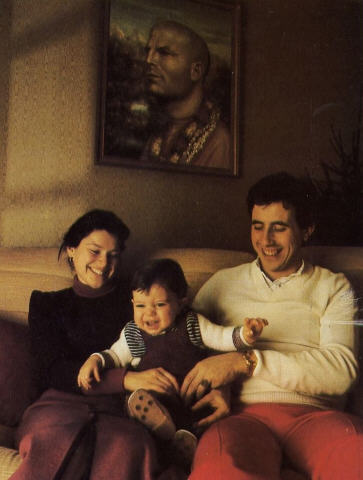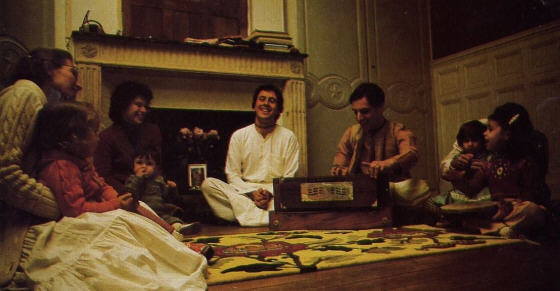When a rising young business executive gets involved with Krsna consciousness,
he finds that material and spiritual success go hand in hand.

Jean Claude Halliche
Jean Claude Halliche is something of a legend at 3M Company, one of the world's hundred largest corporations. At twenty-nine he is the youngest of forty-five directors in France, responsible for more than ten thousand clients in the Paris region and credited with having trained the most effective sales team in the company's history. And even though he wouldn't want people to mistakenly think that Krsna consciousness is some kind of good-luck mumbo jumbo, in his own words, "Everything started happening for me when I began chanting Hare Krsna."
Jean Claude's ambitions before he met devotees of Lord Krsna had little to do with chanting and spiritual dedication. A Catholic by family upbringing, he watched with amused skepticism as devotees chanted and danced their way along the crowded Paris thoroughfares and through tiny streets at Saturday flea markets. No, he hardly saw himself as one of the chosen.
He was preoccupied with a different vision, one of la bonne vie, the "good life" that blares out from billboards and magazine covers and comes wrapped in ermine with million-franc price tags. And why shouldn't he have dreamed of success and wealth? A handsome young man with a winning smile and demeanor could go far if he just applied himself.
So his first visit to a Hare Krsna temple had little to do with interest in life's mysteries, That would come later. For now, in the summer of 1974, he was concerned only with seeing his brother Alain again after more than seven years. Alain had been in India all that time and was now returning to Paris. In his letter, which had arrived the week before, he had invited his family to meet him at the airport and then accompany him to the Paris Krsna temple. As a child Jean Claude had always looked up to his older brother, but Alain's recent involvement with Krsna consciousness was an unexpected change that Jean Claude hoped would not sour their relationship.
The reunion was warm. In the temple Adi-sekhara dasa (Alain had received this name at his formal initiation into Krsna consciousness) told his family why he had adopted the life of a devotee. In India, he said, he had found an understanding of life vastly different from what he had known as a young man in Paris. Even an uneducated person in India knew that within the body dwells the eternal soul, part and parcel of Krsna, or God, and that the soul's material attachments entrap him in a painful cycle of repeated birth and death. In this conditioned state the soul undergoes karma, the reactions to past deeds. No one can surpass these laws, Adi-sekhara said, except a devotee of God. A person who leads a life of purity and devotion to Lord Krsna transcends karma and breaks out of the cycle of birth and death. And this boon is open to everyone. Anyone can become purified and happy by dedicating his activities to Krsna.
Although the strange dress and temple environment still rubbed Jean Claude the wrong way, Adi-sekhara's explanations opened his eyes. There was much more to Krsna consciousness than he had suspected. He learned that the public chanting the devotees did was an ancient practice inaugurated five hundred years ago in India by Caitanya Mahaprabhu, a great saint revered by devotees as Krsna Himself, and that the scriptures and culture followed by devotees were among the oldest and most distinguished in the world. Looking around at the beautifully decorated temple and the devotees in traditional robes, Jean Claude questioned his brother on everything, and Adi-sekhara patiently answered him. "Why did you give up eating meat?" "Because killing innocent animals is cruel and sinful, and because Krsna has provided sufficient nutrition in vegetarian foods. Also, devotees eat only food that has been offered to Lord Krsna. and He does not accept meat, fish, or eggs."
"Why do you shave your head?"
"A shaven head is clean and shows others that we're devotees of Krsna. It's also a symbol of renunciation. It shows that the devotees are more concerned with the eternal beauty of the soul than the temporary appearance of the material body."
"What would happen if everyone became a devotee? How would society go on?"
"Becoming a devotee doesn't require giving up work or family," Adi-sekhara explained. "In the region of India known as West Bengal I visited the village of Mayapur, where devotees are building a model Krsna conscious community. There are farmers, family people, a school, cottage industries everything needed for a complete social structure, but with Krsna at the center. Even if you can't live in or near a temple, you can still be Krsna conscious. Family people can practice spiritual life at home by chanting Hare Krsna, studying the scriptures, worshiping a small Deity form of Krsna on an altar, and offering Him their food."

Jean Claude Halliche With His Family
Jean Claude listened attentively. It all made enough sense for him to begin visiting his brother regularly and attending classes at the temple. "My faith grew from religious as well as philosophical conviction-," he recalls. "I remember as a child how lines of people with cleanly scrubbed faces and starched collars would wait patiently to attend Sunday Mass. Even four services could hardly accommodate all the church-goers. Now there is hardly need for one. God has no meaning for most people anymore.
"But I rediscovered that meaning among the devotees of Krsna. For them devotion wasn't a mere ritual: it was a dynamic energy. It gave purpose to everything they did, from preparing meals to raising a family to doing their work as well as they could. Because the devotees were working for Krsna, they wanted everything they did to be as perfect as possible. That made sense to me."
Jean Claude started attending Sunday festivals at the Paris temple and took up chanting Hare Krsna as a daily meditation. Still, he was reluctant to make a full commitment. Devotional life seemed so total and uncompromising. On the other hand, the devotees' dedication to their work inspired him in his job.
By 1977 Jean Claude was married and working as a dispatcher at 3M. He decided to apply to his own work the enthusiasm he had learned from the devotees. Concentrating on refining the delivery methods at 3M, he often worked late, and his dedication soon drew the attention of his superiors. So the Paris bureau chief offered Jean Claude a six-month training program in management, and less than a year later he became customer services agent.
"Attending classes in the Bhagavad-gita and chanting the holy names of Krsna gave me a certain edge in my work," he says, "namely greater dedication and a sense of purpose. I wasn't just working for myself or 3M anymore: I was working for Krsna. In addition, I acquired a better understanding of human psychology, which is what business is all about anyway: knowing how to motivate a staff, how to recognize a person's capacities and respond to his or her emotional level."
Six months into his new post Jean Claude earned a promotion to sales inspector. By the end of his first year, at age twenty-three, he became the company's best salesman and received the annual award for outstanding achievement. He repeated that feat the following year and again the next. In 1980 he became director of operations and moved into a new home close to the Hare Krsna chateau fifteen miles north of Paris.
Although by now Jean Claude had become deeply involved in Krsna consciousness, he still hesitated to make a lifetime commitment by taking initiation. At the time of initiation, a devotee must vow to chant the Hare Krsna mantra a minimum of 1,728 times a day and to follow four regulative principles. He must give up meat, fish, and eggs; gambling; intoxicants (including coffee, tea, and cigarettes); and illicit sex (sex with someone other than one's wife or for reasons other than procreation). That Krsna consciousness had brought Jean Claude many welcome changes in his life was beyond question. That he would be able to adjust to the strict rules of initiation was less so.
"I never met Srila Prabhupada, the founder of the Krsna consciousness Society," Jean Claude explains. "By the time I was ready to consider initiation seriously, he had passed away. Without him, I wasn't sure I could find competent personal guidance in moments of difficulty. But fortunately for me and for many others Srila Prabhupada had delegated responsibility for initiating new devotees to his seniormost disciples. In France, Srila Bhagavan Goswami was fulfilling that duty as well as guiding the management of temples across southern Europe. Adi-sekhara brought me to meet him. We talked, and I expressed my doubts about being able to adjust to the rigors of temple life. Still, I wanted initiation and also a chance to tell others about Krsna consciousness."
Bhagavan Goswami agreed to initiate Jean Claude and gave him the name Janardana dasa, which means "servant of Krsna, the conqueror of the atheists."
"Bhagavan Goswami never asked me for any money, but I wanted to express my gratitude, so I started giving donations from my salary. That same week I received a large raise. It was practically mystical! And the more service I did acting as chauffeur for Bhagavan Goswami or helping with festivals and feasts the more confidence I felt in my devotional life and my life at the office."
Janardana enthusiastically recalls the encouragement he received from Bhagavan Goswami. "Whenever I told him of some success I had had in business, he shared my celebration and repeated the news to guests and devotees. Once the Indian ambassador to France visited him and Bhagavan Goswami mentioned that one of his disciples had recently been promoted to head of operations for 3M. The ambassador was surprised to learn that people from the mainstream were taking up devotional life, and the following day I received an invitation to join him for lunch at the embassy." Janardana had found his mission: meeting people in positions of responsibility and showing them by his own example how Krsna consciousness was meant for everyone.
Today Jean Claude's supervisor describes him as "a fearless worker who commands the respect of his colleagues." His colleagues describe him as a "worker-priest" with 3M stamped across his forehead, a combination of meditation and moxy. Every Monday he gathers his eight-man sales team in his office. Good work is commended, but there is no room for sentiment. Incomplete or illegible order forms are returned with a peremptory flourish "Sloppy" written across the margin says it all. Each salesman steps forward and shows his presentation book. "Where is your brochure on the new photocopier? I don't want to see this until you've done it right." Never mind that some of those he reprimands are twice his age. Jean Claude runs a tight ship.
At home Jean Claude's drive translates into enthusiasm for centering his family life on Krsna and introducing others to Krsna consciousness. He often invites friends and business acquaintances over for prasadam(vegetarian food offered to Krsna) and talks about his new-found spirituality. His twenty-three-year-old wife, Sylvia, shares his memories of a religious childhood. "Our families objected at first to our involvement in Krsna consciousness. People generally have such a superficial idea of what it means. But now they see that I'm still a responsible mother and Jean Claude is still a successful businessman, and that has allayed their fears."

But life is not without its shocks. A recent incident brought home to Jean Claude the precariousness of life in the material world and the great value of Krsna consciousness in a calamity.
Saturday, January 9, 1982, a treacherous ice slick formed on the roads across northern France. It was the worst cold wave in nearly a century. Jean Claude, who lived next door to Adi-sekhara and his wife Mahima-bhusana, had left for a weekend company gathering. Upon his return Monday morning he learned the news: Mahima-bhusana had died in a car crash that weekend. She had gone out to shop and had left her three children in the care of the temple nursery. Janardana, his wife, and everyone at the temple was devastated. Mahima-bhusana had been a beloved senior devotee whose dedication was admired by all who knew her.
Jean Claude reflects on the incident. "Here is a clear example of the difference between a devotee's life and that of a non-devotee. Everyone loved her. and her passing was a great loss, especially for the children. But it was not tragic. The devotees gathered in the temple and chanted in her honor. Those who knew her best eulogized her advanced spiritual qualities, and a feast in her honor was offered to Krsna and served to everyone. She had been called back to the spiritual world by Krsna, and that was a cause for celebration. A nondevotee, without training in the meaning of death or the soul's passage into a new life, has nothing but his own misery to think about when someone he loves passes away. Some people never recover from such things, but devotees become inspired."
What about the children? How could Mahima-bhusana's death be anything but tragic for them? Jean Claude answers, "One of my relatives argued like that. 'Where is your Krsna now!' she screamed. She was shaking with rage that God would do such a thing to the children. But these are not ordinary children. To be born to devotee parents is a sign of great spiritual advancement in previous lives, and the reactions of the children bore that out. They're young, yet they grasped that their mother had left and returned to Krsna, and that made them happy. In a temple community children are surrounded by sensitive, loving adults and many young friends. There is great emotional as well as spiritual support at such moments. And throughout their lives these children will always see themselves as the offspring of an advanced devotee who has gone on to perform even more wonderful service to Krsna elsewhere. That vision will be a source of great strength for them. For children who don't have that background or the support of a spiritual community, such an event is certainly much harder to bear.
"I've had people tell me, 'You're trying to escape reality by becoming a devotee of Krsna.' Well, there's nothing realer than death, and how the devotees dealt with Mahima-bhusana's death has convinced me that they're the only people who don't try to escape reality. A nondevotee family would have been crippled by the event, but Adi-sekhara and the children saw it with such mature Krsna conscious understanding that they weathered the storm and have become even more committed to serving Krsna. To me, this is facing reality head on."
But what about Jean Claude himself? What about having sacrificed the prospects for greater career advancement by dedicating so much of himself to spiritual pursuits? He quietly studies his long, thin hands for several moments. "True," he says "I've become less concerned with gaining wealth, honor, and position for myself. But there's an important reason for this. In the Srimad-Bhagavatam, one of the basic books of transcendental knowledge all devotees study, there is an instruction that explains why I've changed the focus of my life."
Jean Claude picks up Volume One of the Bhagavatam's First Canto and leafs through it. Then he reads, "'People who are actually intelligent should endeavor only for that which is not obtainable even by wandering from the topmost planet (Brahmaloka) down to the lowest planet (Patala). As for happiness derived from sense enjoyment, it can be obtained automatically in the course of time, just as in the course of time we obtain miseries even though we do not desire them.
"Do you see? Sure I struggled hard to rise to the top at 3M. But I know now that all my success came because of Krsna's blessings. My task now is to maintain what I've achieved and use it for His service, and to work toward perfecting my spiritual life. So there's nothing inconsistent in a businessman's forgoing material profit for spiritual profit. In the long run, that's just good business."
